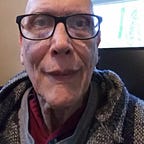In my 20s AND 30s, I worked a lot of minimum-wage, dead-end jobs. Even after subtracting on the job time, commuting time, sleeping time, routines of daily life time, and time for hobbies, entertainment, and socializing, I was able to contribute quite a few hours per month to one or another organization promoting unions, worker rights, regulation of polluters, an end to unjust wars and military interventions, civil rights and fairness for blacks, etc. There were also years in those decades during which I wasn't a social justice activist. What made the difference was whether I happened to live at a place at a time when a handful of people had the gumption (so not including me) to take the initiative to form an organization, write a statement of purposes and stances, and recruit members. (As an enneagram 9, I'd be a better person and and citizen, with more gumption, initiative, and organizer ability, if I developed my weak 8 wing.) Low-wage employees with little spare time can accomplish a lot in their work places and communities given contact with effective organizers and organizations. Becoming an effective organizer takes skills that ordinary people learn little by little through effort and practice. On that topic, I recommend the books SOUL OF A CITIZEN: LIVING WITH CONVICTION IN CHALLENGING TIMES by Paul Rogat Loeb, FREEDOM SUMMER by Doug McAdam, and I'VE GOT THE LIGHT OF FREEDOM: THE ORGANIZING TRADITION AND THE MISSISSIPPI FREEDOM STRUGGLE by Charles M. Payne. In any social movement, many quite ordinary persons show up, volunteer, accept a little and then more and more responsibility, and become leading organizers. And they draw into participation shyer persons like me.
2 min readJul 3, 2021
Born in 1942. Had an antiquarian bookseller career. Avocation creative writing. Unitarian Universalist, raised Catholic. Support Movement for a People’s Party.
